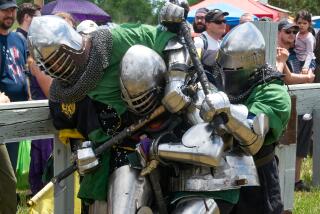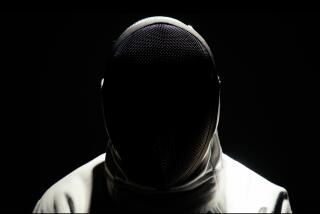Lifestyles of Rich and Fierce at German Festival : A castle near Cologne hosts jousting contests that are part history, part fantasy.
- Share via
COLOGNE, Germany — At noon on a damp morning last June, as the first wave of visitors approaches the bridge across the moat, the American-born lady of the castle is still in jeans and baggy sweat shirt.
The Countess Beissel von Gymnich--the former Jeanette Brogan of Washington, D.C., Roanoke, Va., and a string of international sites where her father served the U.S. State Department--is too busy looking for her children to worry about getting in costume for the upcoming medieval fair and jousting tournament on the 14th-Century castle grounds.
She stands on the steep steps leading to the castle office, her eyes searching the rapidly filling courtyard for 3-year-old Max and 6-year-old Patricia, who has the unfortunate nickname of “Poupie.”
Satzvey Castle--a Teutonic brick fortress in a wooded area less than an hour’s drive from Cologne--is the real thing. And so are the count and countess who host the annual Satzvey Ritterspiele (knights’ games, in English), a festival that for a few weekends each June re-creates medieval lifestyles of the rich and fierce.
This is a long way from the American dinner theater version of a jousting tournament. No buxom wenches wrestling huge trays of fatty prime rib. No essence of horse apples wafting through the air. No ringside tables risking fallout from who knows what.
The annual June jousting tournament/medieval fair at Satzvey is as wild and crazy as it gets in this politically conservative part of western Germany, more known for serious government and scholarship than for frivolity.
Satzvey Ritterspiele started about 12 years ago when a group of jousting enthusiasts asked to use the castle grounds as a tournament site. The tournament was such a success, Count Beissel developed the idea further. He now leases the castle to corporations for medieval incentive parties. Following a few tournament events, the count and countess host medieval dinners for small groups of 40 or so. Paying guests from German, Japanese and American companies keep the castle operating in the black year-round. Still, it’s the June Ritterspiele that is by far the most elaborate and attended.
It is something to see. The 1395 brick castle with its flying banners mirrored in the moat. Knights in full “armor” wandering in and out of crayon-colored tents. Hooded horses high-stepping their way over cobblestones to the jousting court.
Troubadours wander about, piping ancient melodies on primitive instruments, casting an evil eye on those who listen but don’t drop a coin in the cap. There are enough tunics and tights, pointed-toe shoes and flowing plumed hats to stage an all-Faust opera festival.
So what if the authentic medieval German warriors arrive in the company of Vikings and samurai. So what if the knights are stuntmen from Hungary and, on closer examination, their armor is heavy metallic yarn. It doesn’t really matter that the troubadours are retired schoolteachers from the Netherlands whose fancy get-ups came from a Dutch garage sale. That the magician--a 1970s John Denver look-alike in Pilgrim garb--commutes from Hamburg, where he studies medieval musical instrument making. Or that the best show of the day comes after the spectators have departed and the performers relax into a Middle Ages jam session at twilight, across the moat from the castle and under the protective vines of a thick, twisted grape arbor.
This is, as it turns out, a medieval free-for-all.
A mini-carnival midway leads to artisans hawking goods ranging from feathered helmets to metallic yarn armor, handblown glass to handmade lace, Renaissance-style baubles to carved wooden shoes, wrought-iron candlesticks to ornate walking canes. Antsy children wait in line to be outfitted with wooden swords and cardboard headgear that looks like something Darth Vader would wear.
The feats on horseback that occur later might be as hokey as heroic, but there’s no denying the appeal of watching such a show/parody in a place where the real thing probably took place 500 years ago. One of the Dutch troubadours told me that the Satzvey Ritterspiele draws professional participants from throughout Western Europe and that there are similar events in Italy and France, but Satzvey’s authentic setting makes for a mood not found elsewhere.
And just sniff that air! Over at the Viking Camp, a chunk of grilled beef on a slab of bread costs a few dollars. It may not be German, but, then, Vikings were soldiers, too. Beef aside, the crowd is obviously enthralled by a Viking woman draped in a smashing one-shoulder ensemble made only of fur.
Wild mushrooms, flavored with herbs, simmer in enormous skillets at another tent. Next door, sausages sizzle on grills. Chocolate bubbles in a pot, ready for pouring over crepes or waffles. Not authentic for the period, but who needs relevance when it comes to chocolate?
It is early afternoon, Max and Poupie have been rounded up, and the American-born countess, now in a vivid gold brocade gown and a crimson velvet headdress, joins her elegantly costumed husband for the procession to the tournament grounds. Their regal pace zigzags as they sidestep puddles left by the morning rain.
They follow groups of knights and warriors of every kind, manned primarily by German clubs dedicated to medieval arts. Costumes are as authentic as possible. One club with a penchant for things Japanese focuses on the samurai with great attention to detail, down to custom-woven silk featuring the Asian warrior symbols.
Next come the boisterous Vikings, waving and drawing cheers. Then the jugglers, musicians, dancers and magicians. About 300 march in the jubilant procession invoking another era.
By the time the dignitaries have settled in their seats at either end of the field, excitement is at the boiling point. A mighty cheer from the bleachers greets the introduction of each of the competitors on horseback. The horses, covered from nose to tail in vivid silk geometric designs, with only their ears, eyes and tail showing, toss their heads in anticipation.
The action begins with each of the knights on horseback taking a turn at driving a lance through a suspended ring. With each succeeding run, the ring grows smaller.
Next the knights use swords to hack blocks off pegs.
Then the mood turns even more serious as the knights ride through rings of fire and use their spears to strike weights on a revolving wheel.
Hungarian charm overflows when the knights ride to the end of the field to collect ladies’ handkerchiefs to carry into battle. They then ride toward each other at full tilt, each trying to knock the other off of the horse. But the winner gallantly helps the vanquished to his feet as the crowd roars approval.
Through it all, there’s a constant parade up and down the sidelines of youngsters running back to the refreshment stands, waving wooden swords, challenging other mini-knights to contests of balance along narrow boards bridging mud puddles.
The grand finale brings a deafening chorus of martial music from the loudspeaker. The horses paw the mud as the knights mount for one last burst of stunts, like the explosion of a string of firecrackers. Then the horses lay down mid-field while their riders remain standing . . . and it’s over.
Tired spectators straggle back across the moat, booth owners pack up their merchandise, the puppet theater is dismantled and men in whimsical costumes gather for one last beer at the bar. It’s been a long, hard day for knights and friends at the castle.
GUIDEBOOK
Jousting Festival
at Satzvey Castle
Getting there: Satzvey Castle is about a 40-minute drive west of Cologne, about three miles northeast of the small town of Mechernich. A train runs between Cologne and Mechnernich.
Dates for the 1992 Ritterspiele are: June 6-8, 13-14, 18, 20-21 and 27-28. Hours: 11 a.m. to 6 p.m. General admission: $7.50, plus $5 for grandstand seating; allow $10 per person for snacks. If sitting on the grounds, reservations aren’t necessary. But for grandstand seating, reservations are recommended. For reservations, write to Graf & Graffin Beissel von Gymnich, Organisation von Festspielen, Burg Satzvey, 5353 Mechernich-Satzvey, Germany.
More to Read
Sign up for The Wild
We’ll help you find the best places to hike, bike and run, as well as the perfect silent spots for meditation and yoga.
You may occasionally receive promotional content from the Los Angeles Times.






